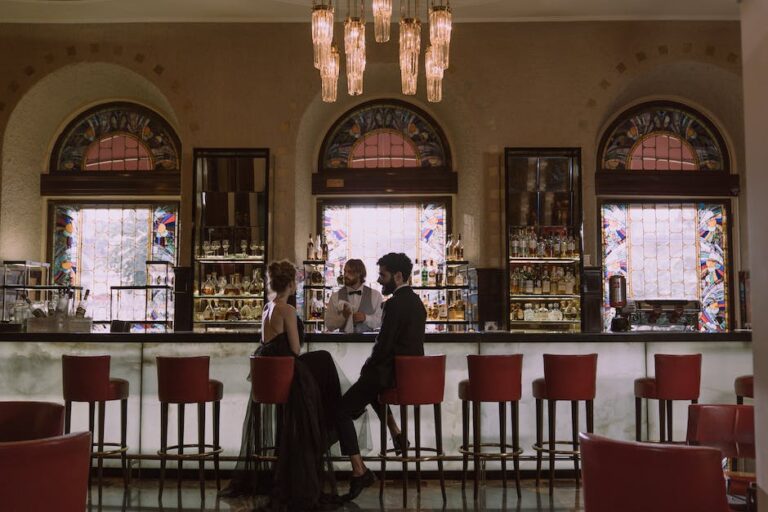Love on the Big Screen: How Dating Movies Shape Our Expectations
The Impact of Romantic Movies on Our Love Lives
Romantic movies have become a staple in our entertainment culture, captivating audiences with their heartwarming and often idealized portrayal of love stories. From the passionate kisses in the rain to the grand gestures of devotion, these movies have a way of tugging at our heartstrings and filling us with a sense of hope and longing for our own romantic adventures.
However, it is important to recognize that these movies are works of fiction, carefully crafted to elicit strong emotions and create the illusion of perfect love. While they may provide us with moments of escape and fantasy, it’s crucial to maintain a sense of perspective. Real-life relationships are far more complex, with their own challenges and imperfections. It’s easy to get caught up in the romanticized version of love depicted on screen and develop unrealistic expectations for our own love lives.

• Romantic movies often present an idealized version of love and relationships
• They can create unrealistic expectations for our own love lives
• Real-life relationships are more complex and have their own challenges
• It’s important to maintain a sense of perspective when watching romantic movies
• Enjoying these movies is fine, but we should balance our expectations with reality
Unrealistic Relationship Expectations Portrayed in Dating Films
Are you a hopeless romantic? Do you find yourself captivated by the magical love stories portrayed in dating films? You’re not alone. Romantic movies have always been a crowd favorite, offering an escape into a world where love conquers all and happily ever afters are the norm. However, it’s important to recognize that these movies often present unrealistic relationship expectations.
In the world of dating films, love at first sight is a common occurrence. We see two strangers locking eyes across a crowded room and instantly falling head over heels in love. While this might make for an entertaining storyline, it’s not a realistic depiction of how most relationships start. In real life, love takes time to develop and grow, and it often requires effort and compromise from both parties involved.

How Romantic Comedies Influence Our Perceptions of Love
Romantic comedies have become a staple in our movie-watching repertoire, offering us a picturesque portrayal of love and relationships. These films often present idealistic scenarios with perfect couples overcoming obstacles, drenched in sweeping romantic gestures, and ending in happily ever afters. It’s no wonder that they have a profound influence on how we perceive love.
The problem arises when we start believing that these movie fantasies are the norm, setting unrealistic expectations for our own relationships.

The Role of Hollywood in Shaping Dating Norms and Expectations
When it comes to dating norms and expectations, Hollywood undeniably has a significant role to play. The movies we watch often depict idealized versions of love and relationships, presenting us with fairy-tale narratives that shape our perceptions of what romance should be like. From the grand gestures to the perfect endings, these portrayals can create unrealistic expectations in our own dating lives.
Romantic films tend to focus on the whirlwind romances and passionate encounters that captivate audiences around the world. We are led to believe that love happens effortlessly and that true happiness can be found by simply finding “the one.” These narratives often neglect the complexities and challenges that go hand in hand with real-life relationships. As a result, we can find ourselves comparing our own experiences to the fantastical worlds depicted on the big screen, leaving us feeling dissatisfied or disillusioned when our own love lives don’t measure up. It’s important to remember that movies are works of fiction and that real-life relationships require effort, compromise, and a healthy dose of reality.
The Power of on-screen Chemistry: Does it Reflect Real-life Relationships?
Chemistry between on-screen couples can be electrifying and captivating, leaving audiences swooning and believing in the power of love. The intense connection portrayed by actors can often make us wonder if it reflects real-life relationships. However, it is important to remember that what we see on screen is carefully crafted and scripted to create a captivating story. The chemistry between actors is a result of their skill, professional training, and the direction they receive to bring their characters to life.
On-screen chemistry is primarily a result of the actors’ ability to portray their characters convincingly. They work together to create a believable relationship, incorporating aspects such as body language, facial expressions, and dialogue. The chemistry we witness on screen is a product of their acting abilities, rather than an indication of a real-life romantic connection off-screen. While it may seem realistic and electrifying, it is essential to understand that it is part of the fictional world created for our entertainment.
Exploring the Stereotypes and Clichés Perpetuated by Dating Movies
Stereotypes and clichés are a common occurrence in dating movies, often shaping our understanding of relationships in unrealistic ways. From the classic “meet-cute” to the predictable happy ending, these films often perpetuate certain ideas that don’t always align with reality. One common stereotype is the idea of love at first sight, where two people lock eyes and instantly fall head over heels in love. While this can make for a captivating storyline, it doesn’t always reflect the complexities and gradual nature of real-life relationships.
Another cliché often found in dating movies is the “opposites attract” trope. We often see two characters from totally different backgrounds or with opposing personalities coming together against all odds. While this can create an interesting dynamic on screen, it doesn’t always hold true in reality. In the real world, shared values, common interests, and compatibility are often vital factors in building a successful relationship. Yet, these dating movies often emphasize that differences are what make a relationship exciting and passionate, leading us to believe that opposites make a perfect match.
The Influence of Romantic Films on Gender Roles in Relationships
Romantic films have long been a popular source of entertainment, captivating audiences with their enchanting tales of love and romance. However, it is important to recognize that these movies often perpetuate traditional gender roles in relationships. In many romantic films, men are portrayed as strong, assertive, and dominant, while women are presented as nurturing, dependent, and in need of protection.
This portrayal of gender roles in romantic movies can have a significant impact on how we perceive relationships in real life. When constantly exposed to these stereotypes, it can create unrealistic expectations and put pressure on individuals to conform to traditional gender norms. Men may feel compelled to always be the hero, while women may believe they have to be passive and subservient. These narrow definitions of masculinity and femininity can limit our understanding of what healthy and equal relationships truly look like. It is important to critically examine the influence of romantic films on our perceptions of gender roles and strive for more inclusive and diverse representations in media.
From “Love at First Sight” to “Happily Ever After”: Examining Unrealistic Narratives
Love at first sight and happily ever after – these are the extraordinary narratives often portrayed in romantic movies. From the moment the protagonists lock eyes, to the confetti-filled grand gesture in the final scene, we are presented with an idealized version of love that seems effortlessly obtainable. However, it is crucial to examine the unrealistic nature of these narratives and how they can impact our own love lives.
In reality, love tends to be a complex journey filled with ups and downs, compromises, and personal growth. While the idea of falling head over heels for someone upon first meeting can be tantalizing, it often fails to reflect the subtleties and complexities of real-life relationships. Furthermore, the notion of a “happily ever after” ending can set unrealistic expectations for our own relationships, leading us to question whether our love is genuine if it doesn’t mirror the picture-perfect endings we see on the silver screen. By critically examining these unrealistic narratives, we can gain a deeper understanding of love and strive for more authentic and fulfilling relationships.
The Effect of Dating Movies on our Dating Strategies and Approaches
Our favorite romantic movies have a way of captivating us, pulling us into a whimsical world where love conquers all. From grand gestures to serendipitous encounters, these movies often depict an idealized version of romance that can greatly impact our own dating strategies and approaches. We find ourselves longing for that magical connection, hoping for a love story that mirrors the ones we see on the screen.
These movies can have both positive and negative effects on our dating lives. On one hand, they inspire us to believe in the power of love and encourage us to be more open to new experiences. They can teach us about the importance of communication, genuine connection, and the willingness to take risks. However, at times, these films can also create unrealistic expectations, leading us to believe that relationships should always be filled with grand gestures and constant fireworks. They can perpetuate the notion that love is effortless and instantaneous, failing to portray the complexities and challenges that come with real-life relationships. As a result, we may find ourselves disappointed when our own love lives don’t mirror the fairy tale narratives we’ve come to expect.
Balancing Movie Romance with Real-life Relationships: Managing Expectations
When it comes to navigating the realm of love and relationships, movies have the power to shape our expectations. Romantic films, with their picturesque love stories and grand gestures, often create an idealized version of romance that can be hard to live up to in real life. However, it is important to remember that these movies are works of fiction, carefully crafted to entertain audiences and evoke strong emotions.
Balancing the influence of movie romance with the reality of real-life relationships can be a challenge. It requires us to distinguish between fantasy and reality, and to manage our expectations accordingly. While it can be tempting to compare our own relationships to those we see on the silver screen, it is crucial to understand that real-life relationships are often more nuanced and complicated. By grounding ourselves in reality and realistic expectations, we can navigate the ups and downs of love with a greater sense of balance and understanding.
How do romantic movies impact our love lives?
Romantic movies can often create unrealistic expectations about relationships and love, leading us to have higher standards and compare our real-life relationships to the idealized ones on screen.
What are some unrealistic relationship expectations portrayed in dating films?
Dating films often portray love at first sight, grand gestures as the norm, and the idea of finding “the one” without any challenges or conflicts. These expectations don’t always align with the complexities of real-life relationships.
How do romantic comedies influence our perceptions of love?
Romantic comedies often present love as a fairy tale with a happy ending, which can give us an overly optimistic view of relationships. This can make us overlook the hard work and compromises needed to sustain a real-life romance.
What role does Hollywood play in shaping dating norms and expectations?
Hollywood has a significant influence on dating norms and expectations, as their romantic films often set the standards for what is considered romantic or desirable in a relationship. This can impact our own beliefs and behaviors when it comes to dating.
Does the on-screen chemistry in movies reflect real-life relationships?
While on-screen chemistry can be captivating, it doesn’t always translate to real-life relationships. Chemistry in movies is often exaggerated for entertainment purposes and may not accurately represent the dynamics of genuine connections.
What stereotypes and clichés are perpetuated by dating movies?
Dating movies often perpetuate stereotypes such as the “knight in shining armor” or the “damsel in distress.” They may also rely on clichés like opposites attracting or the idea that love conquers all, which can be unrealistic and limiting in real-life relationships.
How do romantic films influence gender roles in relationships?
Romantic films can reinforce traditional gender roles by portraying men as the pursuers and women as the passive recipients of affection. This can shape our expectations of how relationships should be structured and limit our understanding of gender equality in partnerships.
Are the narratives of “love at first sight” and “happily ever after” realistic?
The narratives of “love at first sight” and “happily ever after” are often romanticized in movies but may not reflect the reality of most relationships. Building a strong and lasting connection usually takes time, effort, and overcoming challenges.
How do dating movies affect our dating strategies and approaches?
Dating movies can influence our dating strategies by making us believe in the idea of instant and effortless love. This can lead to impatience, unrealistic expectations, and a tendency to dismiss potential partners who don’t meet the idealized standards portrayed in movies.
How can we balance movie romance with real-life relationships and manage our expectations?
To balance movie romance with real-life relationships, it’s important to recognize that movies are fictional and not representative of all relationships. It’s essential to communicate openly, embrace the realities of love, and understand that every relationship is unique.






